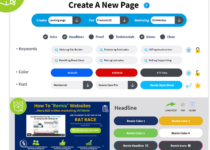Embracing the Digital Frontier: A Deep Dive into Digital Marketing
Digital marketing has transformed the landscape of how businesses connect with consumers, leveraging technology to create impactful campaigns, foster engagement, and drive growth. In today’s interconnected world, where online presence is paramount, digital marketing serves as the cornerstone of success for businesses large and small. Let’s explore why digital marketing is not just a tool but a dynamic force shaping the future of commerce and communication.
1. Accessibility and Reach
Digital marketing democratizes access to audiences like never before. Through channels such as social media, search engines, email, and websites, businesses can reach global markets with minimal barriers to entry. This accessibility levels the playing field, allowing startups and small businesses to compete effectively against larger, established entities. Whether you’re a local artisan showcasing your crafts or a multinational corporation launching a new product, digital marketing provides the platform to amplify your message across borders and demographics.
2. Data-Driven Insights
One of the defining advantages of digital marketing is its reliance on data analytics. Every interaction online generates valuable data points that marketers can leverage to refine strategies and optimize performance. From tracking website traffic and user behavior to measuring campaign effectiveness and ROI, digital platforms offer unprecedented insights into consumer preferences and trends. This data-driven approach empowers businesses to make informed decisions, tailor offerings to specific audience segments, and continuously adapt their marketing efforts for maximum impact.
3. Personalization and Customer Engagement
Digital marketing facilitates personalized interactions that resonate with individual consumers on a deeper level. Through targeted ads, personalized email campaigns, and tailored content recommendations, brands can create meaningful connections and foster customer loyalty. By understanding consumer preferences and behaviors, marketers can deliver relevant content at the right time, enhancing engagement and driving conversion rates. Personalization not only enhances the customer experience but also increases the likelihood of repeat business and referrals, thereby fueling sustained growth.
4. Cost-Effectiveness and Efficiency
Compared to traditional marketing methods, digital marketing offers a cost-effective alternative with higher ROI potential. Digital campaigns can be tailored to fit any budget, allowing businesses to allocate resources strategically based on performance metrics and objectives. Moreover, digital platforms enable real-time adjustments and optimizations, minimizing wastage and maximizing efficiency. Whether through pay-per-click advertising, social media promotions, or email marketing, businesses can achieve measurable results at a fraction of the cost associated with traditional media channels.
5. Innovation and Adaptability
The digital landscape is characterized by constant innovation and rapid evolution. From emerging technologies like artificial intelligence and machine learning to new platforms and algorithms, digital marketers are continually adapting to stay ahead of the curve. Innovation drives creativity in campaign strategies, content formats, and customer engagement tactics. Brands that embrace technological advancements and experiment with new digital tools often gain a competitive edge, capturing the attention of tech-savvy consumers and setting trends within their industries.
6. Global Connectivity and Brand Visibility
Digital marketing transcends geographical boundaries, enabling brands to build a global presence and reach diverse audiences worldwide. Through social media platforms, websites, and online marketplaces, businesses can cultivate brand visibility and awareness on a global scale. Strategic localization efforts, such as multilingual content and region-specific campaigns, further enhance brand resonance and cultural relevance across different markets. Digital marketing empowers brands to connect with international consumers, foster cross-cultural dialogue, and adapt messaging to resonate with diverse audiences effectively.
7. Measurable Results and Accountability
Unlike traditional marketing methods that often rely on estimated reach and brand recall, digital marketing offers precise measurement and accountability. Key performance indicators (KPIs) such as click-through rates, conversion rates, bounce rates, and engagement metrics provide tangible insights into campaign effectiveness and audience response. Marketers can track and analyze these metrics in real time, identifying areas for improvement and optimizing strategies for better outcomes. This data-centric approach not only enhances transparency but also enables stakeholders to make data-driven decisions that align with business objectives and drive sustainable growth.
8. Ethical Considerations and Consumer Trust
As digital marketing continues to evolve, ethical considerations surrounding data privacy, transparency, and consumer trust have become increasingly important. Businesses must prioritize ethical practices and compliance with regulatory standards to maintain consumer confidence and protect brand reputation. Building trust through transparent communication, responsible data handling, and ethical marketing practices fosters long-term relationships with consumers and enhances brand credibility in a competitive marketplace.


